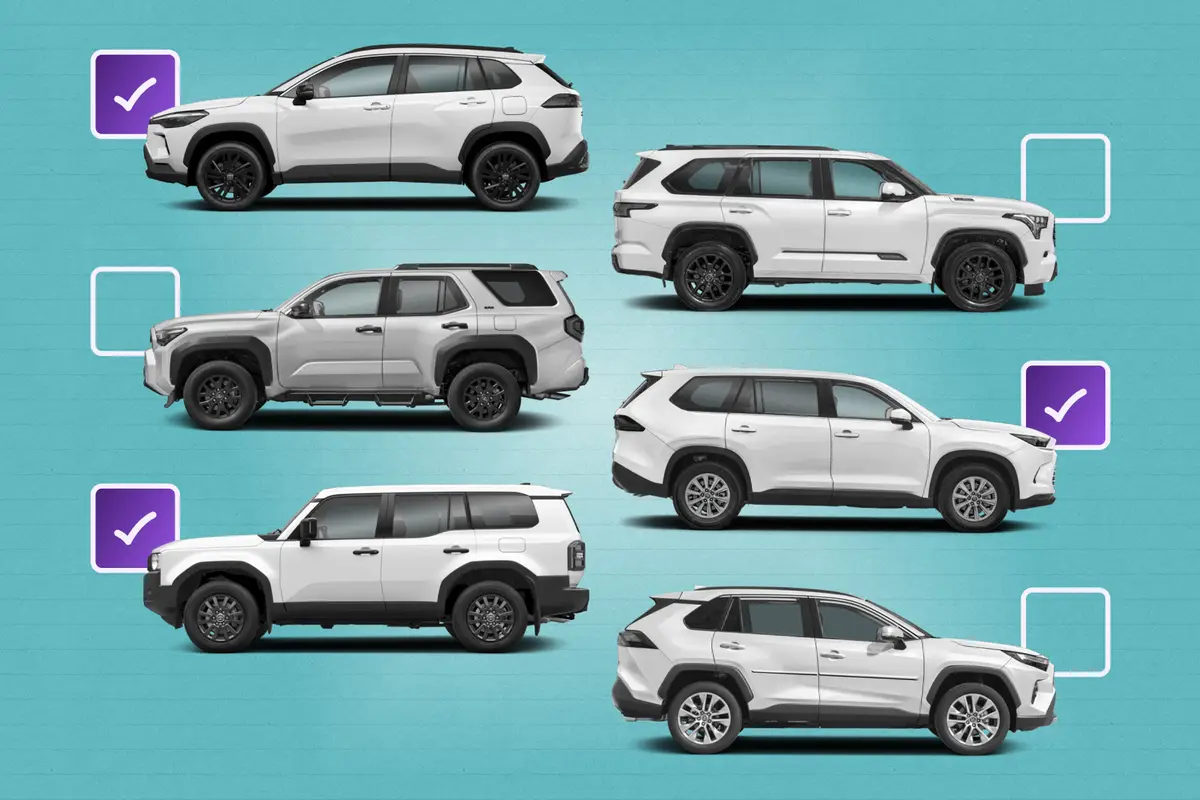Pickup Trucks 101: Gas Vs. Diesel, Which Is Better?
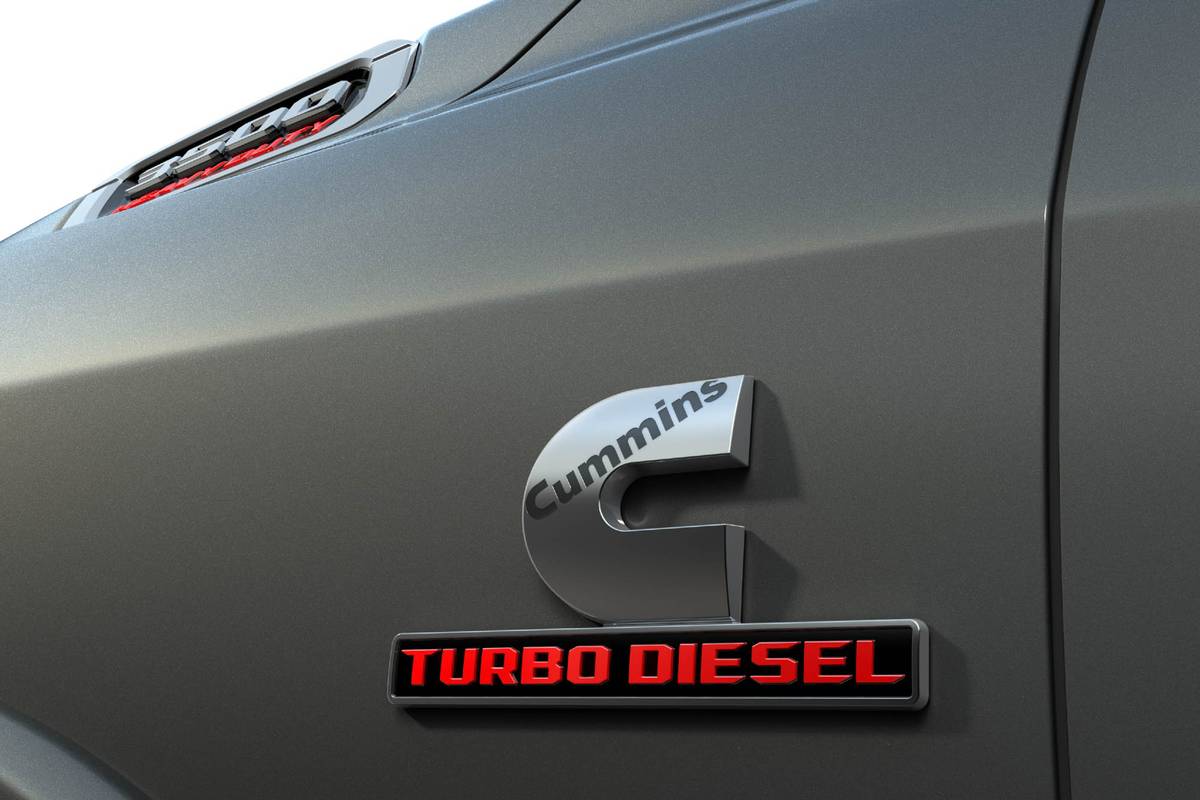
Key Points:
- Choosing between a gas-powered or diesel pickup truck depends on your needs and how the truck will be used.
- Gas pickups cost less, have a higher payload capacity, and are good for lighter duty or less frequent heavy loads, as well as off-roading in mud or in the desert.
- Diesel trucks can have more expensive maintenance. However, they are better for working harder for longer periods of time, have better fuel economy when loaded and have higher resale values.
If you’re in the market for a pickup truck, you may be wondering if you should get a gas engine or a diesel engine since there are significant differences between the two. Those differences vary for mid-size, light-duty full-size and heavy-duty full-size pickups. Which is best for you? Read on to learn more about the differences in the two engine types, focusing not only on the engines themselves, but also on the components that distinguish them.
Related: Pickup Truck Buying Guide: How Much Truck Do You Need?
Longevity and Durability
Advantage: Diesel
- Key takeaway: A diesel engine is built for working harder for longer periods of time, but a gas engine will do just fine if it has to haul a heavy load only once in a while.
As with all things automotive, there is no perfect answer here. Diesels are known to last hundreds of thousands of miles; some people joke they aren’t even fully broken in until you hit 100,000 miles. Generally speaking, diesel engines are built with stronger engine blocks and internals to handle the significantly higher compression ratios when compared to gas engines. Because of this, they tend to handle being worked harder for longer periods of time than gas engines. But if the engine only occasionally has a heavy load placed on it, gas engines can last just as long.
Pre-2005 diesel trucks had very few emissions requirements and therefore didn’t have the same emissions systems that new diesel engines have. With newer diesels, the engines may be just as durable as the diesels of old. However, due to stricter emissions restrictions, there are a variety of other pricey components that will affect the longevity of the truck. It also used to be that you could get a manual transmission with your diesel engine in some of the heavy-duty trucks; alas, that’s no longer an option on any full-size truck in the U.S. market — it’s automatic transmission only now, though a used truck with a manual might prove less expensive to operate over the long term.
Maintenance
Advantage: Gas
- Key takeaway: A diesel engine holds more oil and has more components than a gas engine, which can make their maintenance more expensive than that of a gas engine. However, gas engines may have more internal failures depending on operating conditions.
Generally, the maintenance on a diesel engine will cost more than on a gas engine. Diesels hold more oil, making it more expensive when it’s time for a change. Between the fuel and exhaust systems, there are a lot of filters and components that will need changing that you won’t find on a gas engine. New diesel engines also require diesel exhaust fluid, which needs to be added to meet emissions requirements.
Diesels run at lower rpm, which reduces wear on many engine components. Where a diesel can make up for the higher cost of operation is when it is run hard for long periods of time; under those conditions, gas engines are likely to have more costly internal failures than diesel engines.
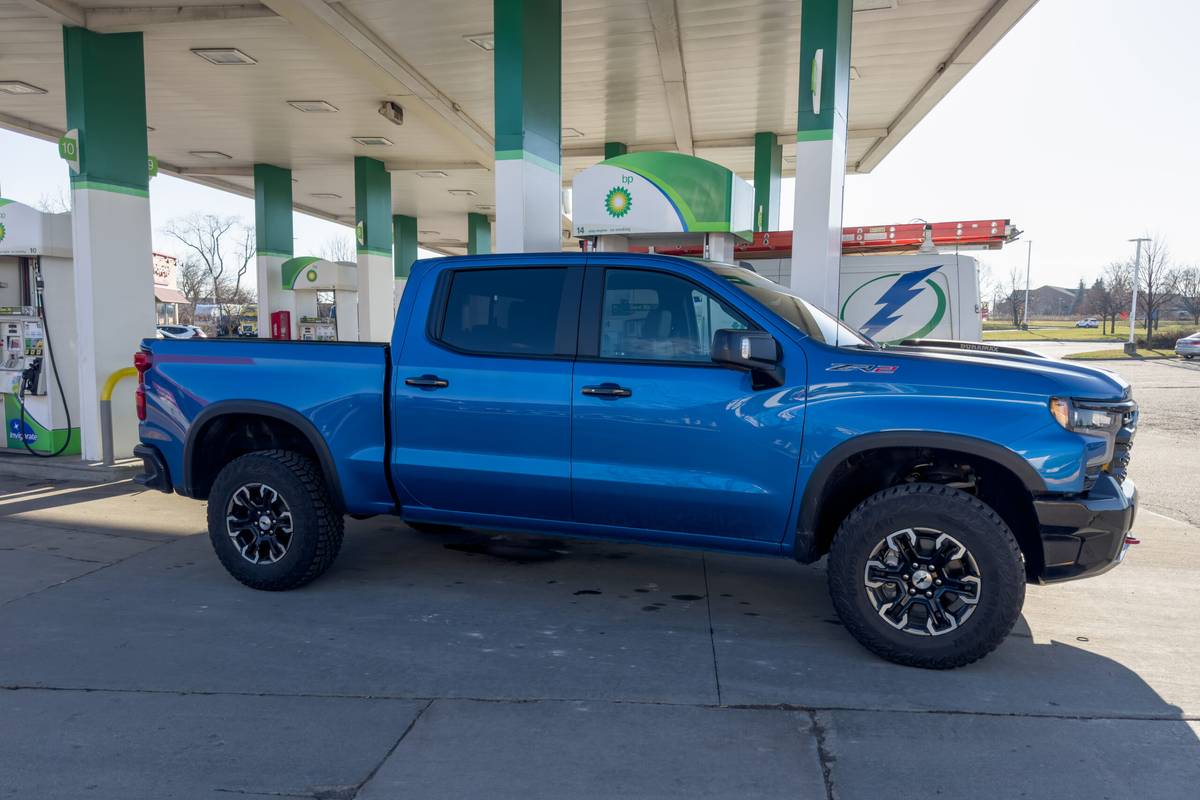
Fuel Mileage
Advantage: Diesel
- Key takeaway: Some late-model diesel trucks can get near 30 mpg on the highway and may save money on fuel compared to a gas truck, depending on usage. However, availability of diesel fuel may be scarce in some areas.
It was common 20-plus years ago to see 25-plus mpg ratings from a heavy-duty diesel engine; now, most real-world drivers see less than 20 mpg. On the other hand, late-model light-duty and mid-size diesel trucks can see EPA highway ratings near 30 mpg. However, there are no diesel engines currently offered in new mid-size pickups (the Chevrolet Colorado, GMC Canyon and Jeep Gladiator did previously, but those engines have been discontinued), and the Chevrolet Silverado 1500 and GMC Sierra 1500 are currently the only half-ton full-size trucks that offer a diesel. Whether you buy new or used, if the truck is used to haul lighter loads for long distances, then a half-ton or mid-size diesel might be the best choice — again, diesel engines perform best when heavily loaded. A heavily loaded diesel will generally return higher mpg than an equally loaded gas engine.
In short, if a heavy-duty pickup is needed day in and day out, a diesel engine will likely save money in fuel. If the truck will only be hauling a small load or driven empty, a mid-size pickup with a diesel will cost less in fuel to drive than a comparable truck with a gas engine.
One other thing to consider is the availability of fuel for gas or diesel: For populated areas, this isn’t an issue, but in some areas, it may be harder to find diesel fuel than gasoline.
Cost of Ownership
Advantage: Use- and Class-Dependent
- Key takeaway: Heavy-duty diesel pickups can cost a lot more than an equivalent gas-powered truck upfront, but they may be less expensive in the long run. Diesel pickups also typically have higher resale values than gas trucks.
Once again, this depends on how the pickup truck is being used. If it’s hauling heavy loads daily and is going to be used for more than 200,000 miles before being replaced, a diesel is likely going to be less expensive in the long run. If the main use for the truck is to pull a camping trailer that’s well below the maximum towing capacity of the truck — or to look cool while getting groceries — then a gas engine will likely be less expensive overall. Upfront costs for a heavy-duty diesel can be more than $10,000 greater than an equivalent gas engine. This cost goes toward the engine itself, the stronger transmission and drivetrain, and additional emissions components. For mid-size and light-duty pickup trucks, a diesel engine offers significant fuel-mileage improvements, and the price premium isn’t nearly as extreme as it is in heavy-duty trucks; on a 2025 Chevrolet Silverado 1500 or GMC Sierra 1500, the optional Duramax diesel engine ranges in cost from roughly $800 to $2,500, depending on trim.
If the truck is accumulating a lot of miles each year, better fuel mileage can make up for the additional cost of the diesel engine within a few years. Typically, that includes paying a little more money for diesel fuel over gasoline.
The final thing to consider, which often gets overlooked, is the resale price of the truck. Pickups with diesel engines historically have retained a higher value than comparable gas-powered trucks.
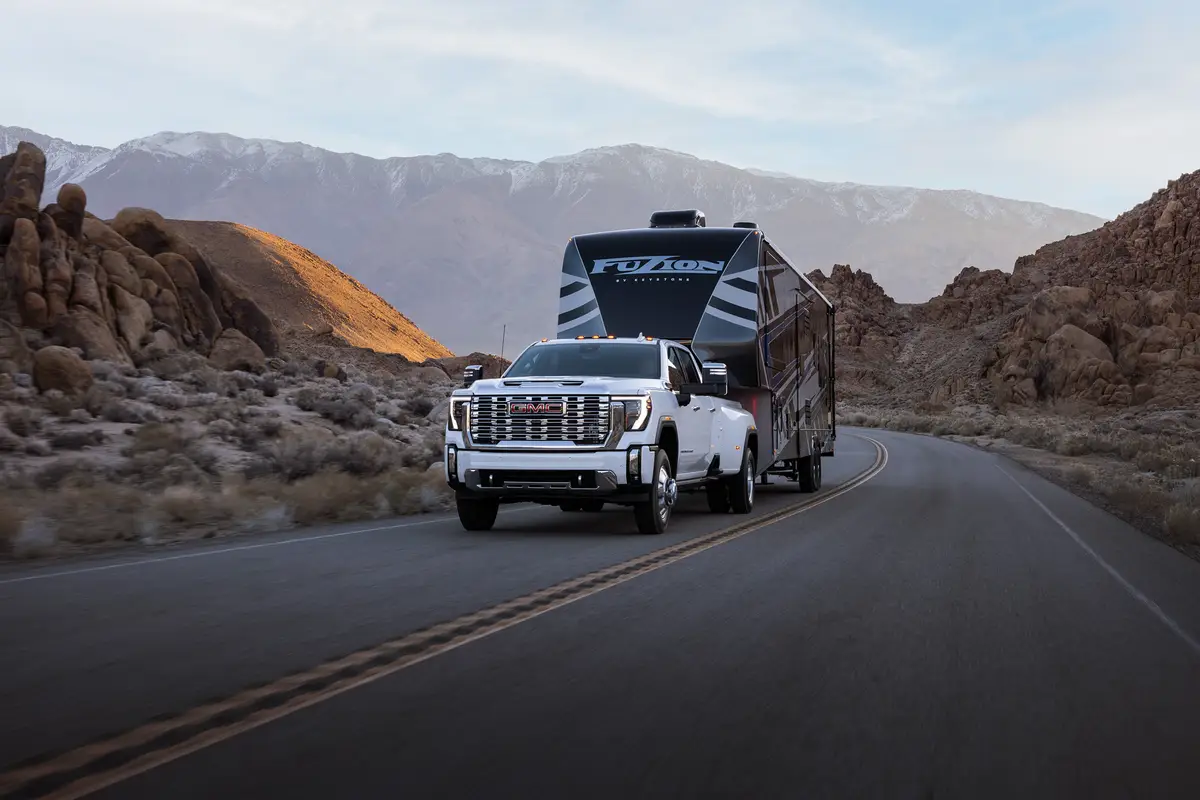
Towing and Hauling
Advantage: Diesel for Towing, Gas for Hauling
- Key takeaway: Diesel pickups have plentiful torque at low rpm and typically get better fuel economy when heavily loaded, and most come with an integrated exhaust brake. However, gas-powered trucks generally have a higher payload capacity.
For towing, a diesel engine is almost always the better option. Diesels have a lot of torque at low rpm, which is what you want when towing. They also get better fuel mileage when heavily loaded and last longer. Another nice aspect about most diesel engines is the integrated exhaust brake. This greatly helps in controlling the truck and trailer when descending steep hills or driving in traffic. The exhaust brake slows the truck by using back pressure from the turbo to slow the engine down. Having this additional method of braking reduces the wear and tear on the brake system, and it reduces the likelihood of the brakes overheating.
Trucks with gas engines are often rated with a higher payload capacity than the equivalent truck with a diesel because diesel engines and their associated systems weigh significantly more than their gas counterparts. The power of a diesel and the exhaust brake will still be helpful when hauling a heavy payload, but if the truck is being pushed to its limits, the lighter weight of the gas engine will allow for a higher payload.
Read More Pickup Truck Coverage on Cars.com:
- 5 Tips for First-Time Pickup Buyers
- Here Are the 10 Cheapest Pickup Trucks You Can Buy Right Now
- What Does Half-Ton, Three-Quarter-Ton, One-Ton Mean When Talking About Trucks?
- More Pickup Truck News
- Shop for a Pickup Truck
Power
Advantage: Class-Dependent
- Key takeaway: A heavy-duty diesel pickup can have nearly twice as much torque as a gas-powered truck. However, the torque advantage for a light- or medium-duty diesel truck may not outway the horsepower of an equivalent gas pickup.
The obvious choice for power in the heavy-duty market is the diesel. Gas engines today just don’t compare to diesels when it comes to torque. Ford, GM and Ram all push more than 900 pounds-feet of torque in their one-ton pickups; gas equivalents usually don’t even top 500 pounds-feet of torque. A diesel is suited for a hard day’s work and will be able to perform where a gas engine simply can’t.
For light-duty and medium-duty pickups, the torque advantage achieved from the diesel often doesn’t overcome the horsepower of the equivalent gas engines. For example, the Chevy Silverado 1500 and GMC Sierra 1500 with the Duramax diesel 3.0-liter six-cylinder only have 305 horsepower but a respectable 495 pounds-feet of torque; the 5.3-liter V-8 gas engine has 355 hp and a relatively modest 383 pounds-feet of torque. The extra horsepower from the faster-revving and higher-revving gas engines make them quicker for spirited driving. The diesels in these classes are designed for maximum efficiency while still being able to get most jobs done. In the heavy-duty class, engines are designed for maximum power while still being reliable.
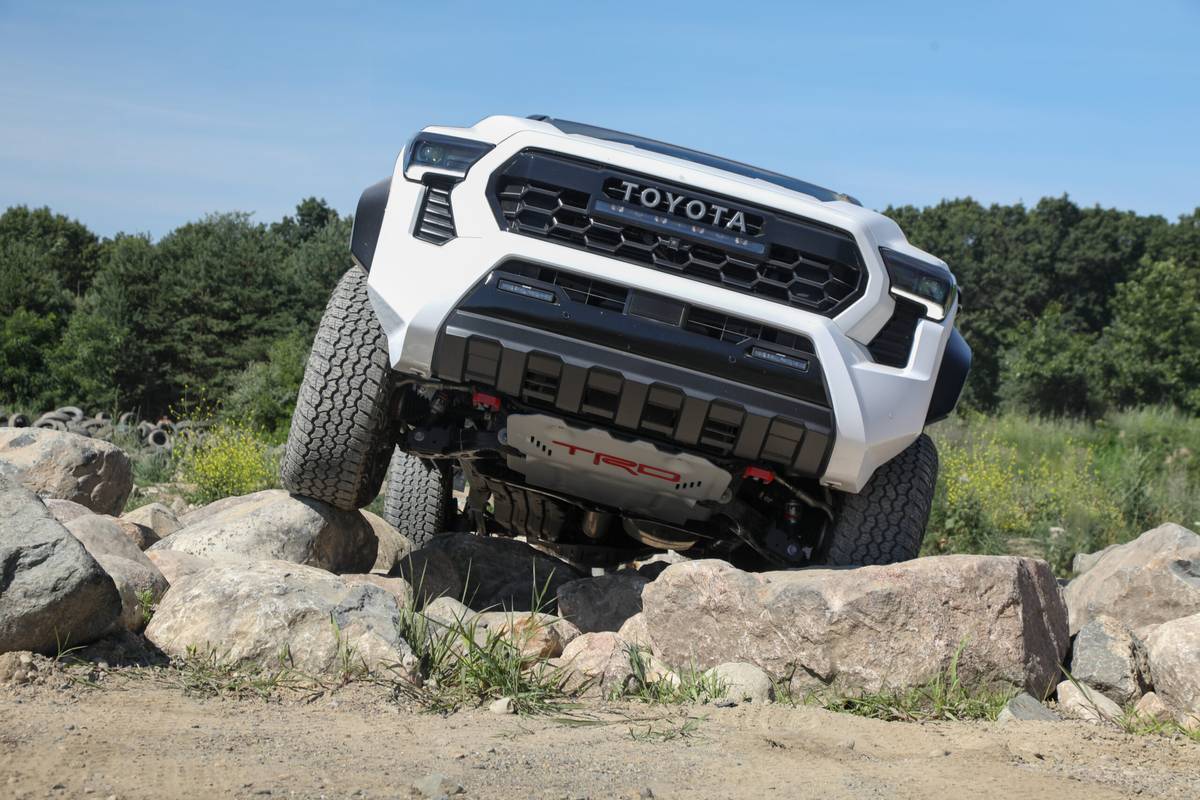
Off-Road
Advantage: Gas (for Americans)
- Key takeaway: Gas pickups offer a wider rpm range in each gear, making them good for clearing mud and desert runs. Diesel trucks, on the other hand, offer extra torque that’s good for steep inclines, and their reliability is good for overlanding.
Many people may be upset at the opinion that gas is the better engine for off-roading, but there are compelling reasons for it. The heavier weight of the diesel at the front of the truck can be detrimental to off-road driving if the vehicle gets stuck in mud or sand. Gas engines also rev faster and redline higher, which gives them a wider operating rpm range in each gear that’s good for desert running and clearing mud from the tires.
Automatic transmissions are so good these days, the higher rpm range of a gas engine isn’t as much of a benefit over a diesel as it once was. Diesels — especially when equipped with manuals — offer more low-speed control for rock crawling. The slow-revving low-end torque is great for getting a truck to move up steep inclines without spinning the tires. Also, with the extra torque from a diesel, the truck will have an easier time turning oversized tires. The current kings of factory off-road trucks include the Ford F-150 Raptor R with a supercharged 5.2-liter V-8 and the Ram 1500 RHO with a twin-turbo, high-output 3.0-liter inline-six. Both are available with gas engines only.
For overlanding rather than strict off-roading, diesels are the engine of preference for improved fuel economy and longevity. In other parts of the world, diesel engines are used extensively as they are often more reliable and can handle lower-quality fuel. Organizations like the Red Cross, Peace Corps and U.N. use diesel-equipped Jeeps, Land Rovers and Land Cruisers because of their reliability in rough, dusty, dirty conditions.
Conclusion
Advantage: Use-Dependent
There is no obvious winner between a gas and diesel engine; each one performs better in certain areas. It all comes down to how the truck is going to be used and what the owner prefers.
Related Video:
Cars.com’s Editorial department is your source for automotive news and reviews. In line with Cars.com’s long-standing ethics policy, editors and reviewers don’t accept gifts or free trips from automakers. The Editorial department is independent of Cars.com’s advertising, sales and sponsored content departments.
Featured stories
